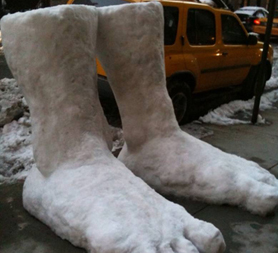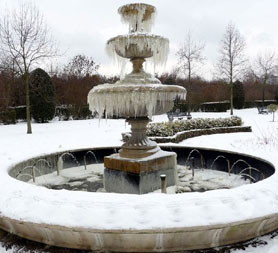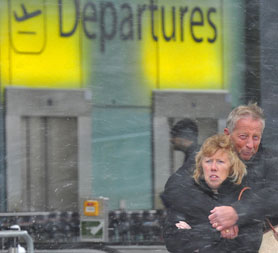Travel pandemonium as snow blankets Britain
Motorists and commuters were forced to sleep in their cars and on trains last night as Britain struggled to cope with the Arctic blast that blanketed most regions with inches of snow and ice.
Drivers were left stranded overnight in South Yorkshire as heavy snow caused major disruption.
Treacherous driving conditions on a stretch of the A57 between Todwick, South Yorks, and Worksop, Notts, meant many drivers were stranded in their vehicles.
For some drivers it was the second night they were forced to sleep in their vehicles.
Other motorists were forced to spend the night at a nearby Methodist hall where they were given shelter and hot drinks, South Yorkshire Police said.
300 sleep on train
In West Sussex, more than 300 commuter passengers were left stranded overnight on a train stuck at Three Bridges station after a series of line failures.
One train failed on the line near the station, another train got stuck behind it then the 8.17pm from Victoria to Littlehampton joined the queue at 9.30pm.
They reached their destination at 6.30am, with workers at the station provided food and drink from all-night garages.
A company spokesman said: “We are incredibly sorry for these passengers and we clearly wanted to get them home and our people did everything they could to get them home.”
It was a similar story for passengers on a London to Kent service had to spend the night on the train because the rails were frozen.
Today, there are major delays and cancellations on Eurostar, Southeastern, First Hull, ScotRail, CrossCountry, East rail and East Midlands.
Southern Trains suspended all their services this morning due to the continued snowfall overnight.
Airports closed
Meanwhile, hundreds of flights were also cancelled at Britain’s second busiest airport, London Gatwick, London City and Edinburgh, while other airports suffered delays.
Gatwick will not open until at least 6am tomorrow, London City until noon today and Edinburgh will not open until 10am today at the earliest.
Transport Secretary Philip Hammond has today launched an urgent review into how various transport systems have responded to the terrible weather conditions.
He said: “We took urgent action during the summer which means we’re better prepared for severe weather than last year – a national strategic salt reserve exists for the first time.
“But I share the frustration of the travelling public and we need to be sure that we are doing everything possible to keep Britain moving.”
He added: “Complacency is not an option. There are lessons to be learned from our performance in every bout of bad weather and it is important that we learn those now.
“Unfortunately, in extreme weather conditions some disruption is inevitable but there is no excuse for poor communication with passengers and motorists.”

Stinging criticism
However, Shadow Transport minister, Angela Eagle, launched a stinging attack on what she called the Government’s lack of preparedness to deal with the big freeze.
Speaking in the Commons, she said: “The winter resilience review commissioned by the previous government has produced its final report and recommendations, yet the country is in chaos with passengers forced to sleep at stations, stuck freezing all night in broken down trains and trapped in their cars – all at a cost to the economy of up to £1.2 billion a day.
“So why aren’t the findings being implemented? The public don’t want you to announce another review by the person who has already set out the blueprint for improvements, they want to you to get on and implement the recommendations and improvements.
“When are you going to get a grip?”
But Mr Hammond retorted by saying that Ms Eagle was “failing to recognise the scale of the weather event” currently gripping the UK and that high volumes of snow coupled with low temperatures would always cause disruption to the transport system.
He said the findings had been implemented, and that he had ordered an “audit” to look at whether they had been applied consistently and to identify new lessons.
He added: “You are failing to recognise the scale of the weather event that is occurring – a significantly bigger snowfall than occurred earlier this year which gave rise to the events which caused my predecessor to implement this review.”
Mr Hammond informed members that a “national strategic salt reserve” now supports local authorities which run low on supplies, with 100,000 tonnes being held and a further 250,000 ordered.
The Highways Agency has 225,000 tonnes for use on motorways and trunk roads and local councils held around one million tonnes in stock at the end of last month.
A further 60,000 tonnes are on order for the Highways Agency and Scotland has stockpiles of 30,000 tonnes.
Lighthouse crew rescued
Stornoway Coastguard in the Outer Hebrides has had a very busy last 24 hours.
It said it airlifted a 20-yesr-old pregnant woman who had gone into labour from Lochinver in the Highlands, on the west coast of Scotland, to Raigmore Hospital in Inverness, just before midday yesterday.
A spokeswoman said: “The helicopter was used because of the weather. The baby arrived safely.”
Just one hour before, four lighthouse workers at North Rona Lighthouse were also airlifted to safety after they ran out of food.
Murdo Macaulay, Watch Manager, Stornoway Coastguard said: “We are pleased that we could assist in recovering the four contractors from their hostile environment without food, and the medical services in evacuating the expectant mother to get her urgently to the Hospital. We have heard that Mother and son are doing fine.”Temperatures across the UK are unlikely to hit zero today, but meteorologists are predicting that the wintry weather will ease off tomorrow.

Snowfall to continue
In England, the Met Office has issued severe warnings of heavy snow in the North East, Yorkshire and Humber, the East, the south west and London and the South East.
Hampshire Police issued a warning to motorists as heavy snow fell overnight.
In Kent, police asked drivers to avoid the M20 after closing the slip roads at Junctions 8, 9 and 10 of the coastbound carriageway due to blizzard conditions and freezing temperatures.
Forces in Essex and Sussex also advised people to only make essential trips as snow fell throughout the night.
Surrey Police told drivers to only use roads in an emergency after declaring all roads in the county treacherous.
Despite gritters working throughout the early hours, its said main roads including the A3, M25, A22, A217 and A31 were “dangerously” affected by the blizzards.
Widespread ice caused major problems nationwide yesterday, with the AA attending more than 11,300 breakdowns. The RAC also saw call volumes rise to unprecedented levels for this time of year.

In Crawley, West Sussex, a motorcyclist was killed in a crash involving a lorry at 5.10am, and a woman died after falling into a freezing lake at Pontefract Racecourse, West Yorkshire.
In Kent, phase one remained in place of Operation Stack, in which the coastbound carriageway of the M20 between junctions 11 and 12 is used to hold lorries travelling towards the Continent.
The sliproads onto the M20 coastbound at junctions 8, 9 and 10 remained closed due to blizzard conditions and freezing temperatures.
Motorists who have essential travel plans are advised by Kent Police to use the A2/M2 and avoid the M20 at junctions 8, 9 and 10.
A police spokesman said: “Although M20 London-bound has no reported incidents, the carriageways are also treacherous with heavy snow and blizzards are causing very poor visibility.”
Temperatures fell to minus 18.6C in the Scottish Highlands last night, with warnings also applying to Grampian, Strathclyde, Central, Tayside and Fife and South West, Lothian and Borders.
Thousands of schools have been closed today, including 1,600 in Scotland, 500 in Yorkshire, 300 in the North East and 350 in Essex.
-
Latest news
-
FactCheck: Labour claims rail reforms would save taxpayer £2.2bn a year

-
‘Authentic Stupidity’: Ben Elton’s new show explores how idiotic human beings can be5m

-
Is Israel’s evacuation of Rafah the precursor to full scale invasion?3m

-
Eurovision: Non-binary artist wins for first time2m

-
Tens of thousands march in Georgian capital against ‘foreign agents’ bill2m

-




